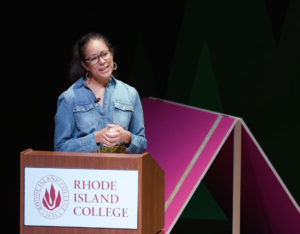Sharing Stories Peace of Mind Blog
I Live For…
After hearing Nikki Webber Allen speak at the 2018 Peace of Mind Storytellers event, I was eager to interview her for our blog. A filmmaker and a mental healthcare activist, Nikki spoke of her experience with depression and how she struggled to speak about it for years. Like many others, Nikki had a great life and felt she didn’t have the right to say she was struggling. Nikki kept this part of her identity to herself until a close family member took their own life; after that, Nikki felt she had to speak up and say something. Since then, she’s used film and storytelling to add her voice into conversations on mental illness and race in our society.

(Above: Nikki sharing her story and passion to end the stigma around mental illness at our 2018 Storytellers)
I’ll be honest: a huge reason I wanted to interview Nikki is because her career in media fascinated me. I’ve always had a deep interest in film and media, but in film classes I never had the opportunity to study or speak with any women filmmakers. I was excited to interview Nikki not just because she’s a filmmaker, but because she’s a woman filmmaker. As a woman, I don’t always get to see women in roles I admire or aspire to. It’s not because they don’t exist, but because they aren’t well-represented.
Representation was a huge factor behind why Nikki wanted to go into film and media production. As a black American, Nikki never saw herself represented in the media she watched. If there were black characters in a movie or show, they were often exaggerated caricatures of what society had decided was “black”. Nikki wanted to create spaces for black Americans to recognize themselves in characters that were not caricatures.
Being a black American is something Nikki views as a huge part of her identity. I wanted to talk more about that because a year ago, I entered a psychiatric hospital and partook in a group for young adults. While most of the group participants were white, those who weren’t often spoke on how seeking treatment had been more difficult for them due to the lack of acceptance in their homes and communities. The stigma of mental illness can be much stronger in black communities. I wanted to hear Nikki’s thoughts and experiences on how mental health care needs to change in order to properly help black Americans living with mental illness.
Nikki shared with me the statistic that over half of black Americans surveyed viewed mental illnesses, such as depression and anxiety, as a character flaw or weakness rather than a serious illness. This mindset strengthens the stigma around mental illnesses and seeking mental healthcare. Nikki also discussed the issues she has faced in having her concerns and opinions understood and validated; she shared with me the pain of an experience of feeling disregarded by a therapist as an example. Even when mental healthcare is available to black Americans, oftentimes the healthcare professional doesn’t truly understand the experience of being black in America and all that can come with that identity.
There are great strides being made in improving mental healthcare and breaking down stigma; however, it is important to acknowledge the work that still needs to be done. Society needs educated therapists who can understand the experiences of black Americans and minorities to ensure quality care for all.
Having conversations about race can be uncomfortable for some people. However, in order for us to break down the stigma around mental illness, we must understand all of its complexities and intersections. Living with mental illness can be an arduous task, and not everyone who faces mental health challenges has the same access to resources and tools. In order to change this, we must first acknowledge the gap. We must have those uncomfortable conversations.
In addition to filmwork and speaking engagements (including a fantastic TED Talk), Nikki has also founded her own 501c3 non-profit called I LIVE FOR…. Dedicated to shattering the stigma around mental illness in all communities, especially for teenagers and young adults of color, I LIVE FOR… uses a myriad of mediums and platforms to share real stories that create safe spaces for honest, unapologetic conversations about mental health. Speaking about her activist activities, Nikki referred to herself as “a firestarter.” I loved this and all that it implied; that with a tiny spark of hope and enthusiasm, she could ignite change. With one small spark, she has started a fire of acceptance, a fire of knowledge and understanding. A fire of normalization. A fire to end the stigma.
Victoria Rose is a writer and musician from Providence, Rhode Island. victoria@peacelove.org
